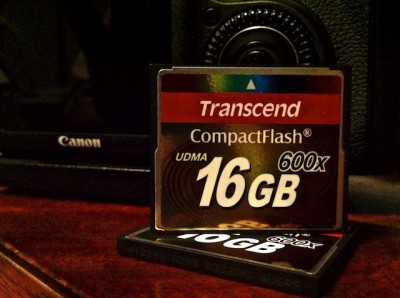
With a trip to Florida looming (more on that another time), and finally converging my world onto a new MacBook Pro (more on that another time also), I figured I would do a little prep work for the trip.
For most people, that would mean figuring out what to visit, what to pack, and other trip details. For me, that means speed tests of CompactFlash cards.
(Yeah, I wear my geek on my sleeve.)
So here’s the deal. I have a Lexar USB 2.0 card reader that’s served me well for years. And within the last year or so, I invested in a couple of pretty dang speedy Transcend 16GB 600x CompactFlash cards. I wanted more capacity, and found these cards on sale for cheap a while back.
Well, with the new laptop, I now have access to USB 3.0 ports, so I picked up a Lexar USB 3.0 card reader. It basically looks the same as the USB 2.0 version, with the exception of the plug difference, distinguishing it as a USB 3.0 device.
While in Florida, I want to shoot some long time lapse series of star trails over the water, and I knew I’d need more capacity for that if I was going to shoot those with my 7D. That led me to look at high capacity cards. I’d been pleased with the other Transcend cards, so I looked to them again. I figured I would shoot for a 64GB card this time, with a thought toward 10-14 hours of shooting at night.
The Transcend 600x card was about $200, with the 400x card being about $100. I didn’t need speed for shooting, but having speed for pulling the images off the card was pretty key. Reluctantly, I went with the 400x card. Doubling the price for a little faster card was something I just couldn’t justify.
Little did I know that I made a great decision.
That’s the backstory. Here’s what I found, when transferring just about 4GB of video files from the cards to the SSD in my MacBook Pro.
| USB 3.0 | USB 2.0 | |
| SanDisk Ultra II 8GB | *** | 5′ 39″ |
| SanDisk Extreme III 16GB | 1′ 29″ | 2′ 02″ |
| Transcend 600x 16GB | 0′ 47″ | 1′ 45″ |
| Transcend 400x 64GB | 0′ 31″ | 1′ 42″ |
Yeah, you read that right. The 400x card is faster than the 600x card, which was quite unexpected. Here’s my theory.
I know the 400x card is UDMA 7. The newer editions of the Transcend 600x cards say they’re UDMA 7, but my slightly older ones don’t. I suspect they are likely UDMA 6, and that’s probably why they’re slower. At USB 3.0 interface speeds, there’s not a ton of difference in the times with 4GB of data aboard.
4GB transferred in about 30 seconds. That’s simply amazing. I can remember copying data to/from 5.25″ floppies — 360KB each — and it taking f-o-r-e-v-e-r to move data around. 4GB is something like 11,000 of those floppies, and I can’t imagine how long it would take to move data off those. Of course, I only had a 40 *megabyte* Seagate harddrive at the time, so it would’ve been moot to try it anyway.
How’s that for some vacation planning? 🙂
